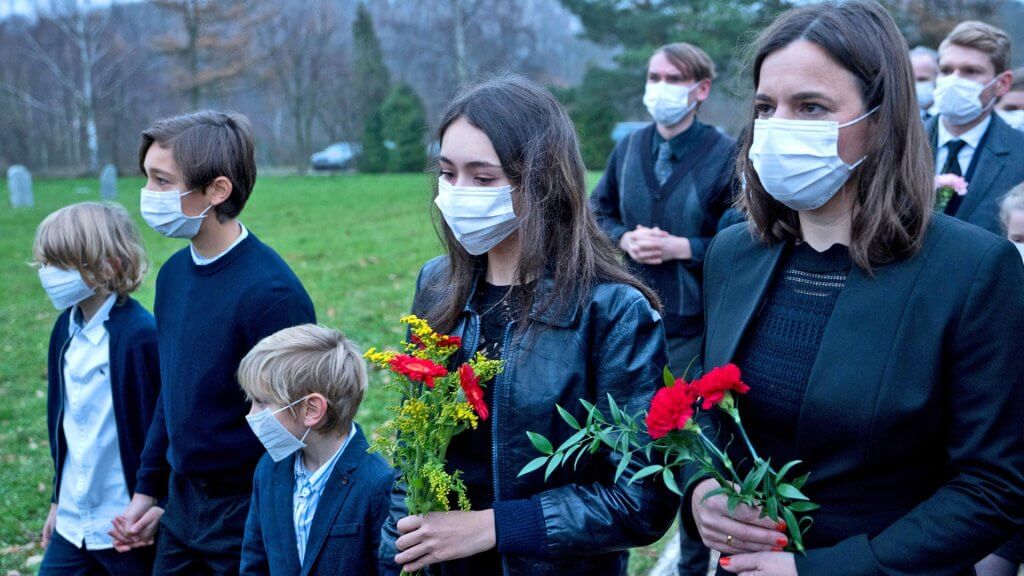By Laurence Herszberg, General Director of Series Mania and Pierre Ziemniak, Project Manager for Series Mania
Tribune published in Le Monde, February 13, 2021.
“Truth is always stranger than fiction” – COVID-19 has pumped new life into the old adage, which is still just as accurate after a year of lockdowns and curfews. Series – as one of the few remaining lit beacons in an entertainment industry that has otherwise ground to a halt – have been tasked with a major responsibility: to reinvent their narratives and formal propositions, so they can tell the story of the sudden eruption of this unthinkable thing into our lives, which are now all hanging in a seemingly unending state of emergency. How can series help us to see beyond the scientific narrative we have been handed, and to think our way through this new normality, in which restrictions on freedom have become standard fare?
Just like the healthcare workers they are so often about, medical dramas have found themselves on the frontlines when it comes to dealing with the shock of the pandemic.
Just like the healthcare workers they are so often about, medical dramas have found themselves on the frontlines when it comes to dealing with the shock of the pandemic. This parallel makes sense, given the ease with which plots that revolve around the virus can be inserted into such series: in the United States, popular programs like Grey’s Anatomy and The Good Doctor (ABC) have focused on illustrating the disaster that is this health crisis, as well as the exhaustion doctors are dealing with. With one limitation: seeing as they are targeted at general audiences and consensus-oriented in tone, they do not venture into critiques of the overall health situation, never mind interrogate the political management of it.

But the times have also led to the birth to another kind of show, one that justifies, through fiction, something we are now only all too familiar with – the way the veil over the privacy of homes has been lifted through constant videoconferencing. How many bedrooms and living rooms have we had the chance to visit over the past year, thanks to computer technology? The cross-screen conversation seen in Netflix’s anthology, Social Distance, are byproducts of our social interactions having been hindered by bans on gatherings. Where is the space for feeling, when any human contact whatsoever amounts to a health risk? The second episode, which follows the impossible mourning of a family as they go through a remote burial, poignantly illustrates just that issue.
You have to head to Israel to find a political critique of this new kind of panopticon: the pandemic has rendered mass surveillance as an instrument of social control acceptable. A series of shorts initiated by cable TV channel HOT, 100 Meters Apart tells the story, in its second episode, of an agent who is usually tasked with antiterrorist tracking, but who has – exceptionally – been assigned a civil population control mission. A phone-bugging system allows him to detect and alert others to any breaches of lockdown. Denouncing the oppressive measures implemented by the Israeli government to fight the virus, the show – which was filmed in spite of local restrictions – bears witness in a different way to our current era, by emphasizing the suspicion that so characterizes it.
But other, more darkly prophetic series had already warned us about antidemocratic downward spirals like these.
But other, more darkly prophetic series had already warned us about antidemocratic downward spirals like these. The Flemish show Cordon (VTM) – which premiered at the Series Mania festival – was the first to imagine, as early as 2014, the quarantining by force of an entire neighborhood in Antwerp, following the discovery of an unknown virus. The exclusion zone, thus laid out, and bordered by imposing shipping containers, creates a space that turns into a laboratory of chaos. Screenwriter Carl Joos turns each protagonist – whether they are a policeman, a scientist, a journalist, or a teenager – into allegorical representations of a society that has been left to its own devices. While their dramatic situation and the absence of any authority leads to the inhabitants expressing their mutual solidarity, it also leads to an explosion of conspiracy theories, and to foreigners being stigmatized, as they are suspected of bringing the disease with them – a warning with strange reverberations in the time of COVID-19.
The German-Danish Sløborn (ZDF), by Christian Alvart, which is even more trying, widens its experimental area to an island in the North Sea that is hit by wave after wave of a deadly avian flu. Filmed prior to the pandemic, but broadcast in the summer of 2020, it slowly lays out its anxiety-inducing narrative: finger-pointing at the youth as soon as the first cases appear, the authorities banning all means of communication save for a single official channel, the building of special hospices unbeknownst to the population, and neo-fascist groups forming in reaction to the government’s policies. A nightmarish but painfully realistic vision of an out-of-control epidemic, the series takes its tale past the point of no-return when it introduces the forced, mass transfer of populations – a measure taken in desperation by an overwhelmed ruling elite.

There is a radical counterpoint out there to these critical and anxious Western productions. The Chinese show With You – legally accessible on iQiyi from all over the world – edifyingly portrays an exemplary nation in a time of crisis, showing the devotion of healthcare workers in Wuhan and civilian cooperation. “We are doctors, but we are also soldiers” is the point the patriotic series – the veracity of which one could be excused for having doubts about – loves to hammer in. It is a total panegyric ode, and shows little concern for the instances of liberty deprivation that have punctuated this crisis since the beginning.
There is something genuinely moving about this way of re-envisioning a tragic reality. There is also something worrying about the ever-growing power of fiction over our imaginations – be that in the way we anticipate, analyze, or choose to re-tell the stories of crises. There is something surprising, too, about the fact that neither Cordon nor Sløborn are available in France, at a time when it has never been more crucial to encourage the intra-European circulation of programming, and to export series more widely.
We have not yet beaten COVID-19, but the battle for narrative control over it has already begun.
We have not yet beaten COVID-19, but the battle for narrative control over it has already begun. And the French Ministry of Defense has made no mistake: to help anticipate future threats, they have been turning to one of the few categories of experts that cannot be found chatting away on every other talk show on TV – screenwriters.